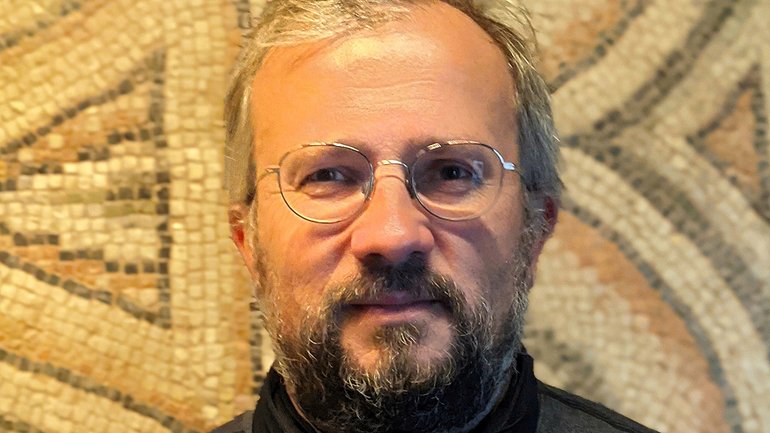
In my publications since 2014, I have repeatedly stressed that the first wave of the Russian military aggression against Ukraine was underpinned by an ideological device known as “Russian world” (see, for example, “Interpreting the ‘Russian World,’ in Andrii Krawchuk and Thomas Bremer, eds., Churches in the Ukrainian Crisis, New York: Palgrave, 2016: 163-171).
This device was originally designed during the 1990s by liberal Russian political scientists. However, in the 2000s, it was taken over by the Moscow Patriarchate, which radically refurbished it and, with its assistance, geared up the conservative turn in both Russian society and Russian Orthodox Church. The “Russian world” was only partially successful in mobilising popular support to Putin’s advances in Ukraine in 2014. With its help, he managed to annex Crimea and waged a war in the Donbas area in the eastern Ukraine. However, he failed to instigate the fully fledged “Russian spring,” which, as he hoped, would engulf the entire south-eastern region of Ukraine. After such a failure, the ideology of the “Russian world,” it seems, was shelved. Only marginal groups continued referring to it. Even the Russian church officially preferred not to mention it.
The second wave of the Russian military aggression against Ukraine, which began on February 22, 2022, is also ideologically framed by the “Russian world.” This time, however, President Putin became the main speaker on its behalf. In his almost-one-hour long address broadcasted on February 21, 2022, he lectured on the history of the Russo-Ukrainian relations and tried to justify the upcoming escalation of the military conflict. One can see this address as effectively advocating for the “Russian world.” Putin’s vocabulary is borrowed from the language of the church’s proponents this doctrine, such as the Patriarch of Moscow Kirill.
One also has a rare opportunity to have a glimpse at what really absorbs Putin’s mind. Apparently, he is obsessed with Ukraine. His take on its relations with Russia is mythical. He is both a demiurge and a faithful adept of the myth that constitutes the core of the “Russian world” doctrine. As many myths, this one features a strong religious dimension. That’s why Putin, in his address, made detailed references to the situation surrounding the Ukrainian Orthodox Church of the Moscow Patriarchate.
However, such references are not the most important religious component in Putin’s mythical consciousness. It is rooted in a dualistic, dichotomising, and Manichaean worldview. According to such worldview, which Putin applies to politics, Russia is almost an embodiment of the cosmic goodness: it is patient, forgiving, sometimes naïve. It is systemically cheated and abused by the cosmic evil, which for Putin is embodied in the NATO and the United States. The West cannot be trusted, because it cannot be trustful by its very nature. In this dualistic picture, Ukraine is lost between the good and the evil. Ukraine has many good things inside, but they are imprisoned within the devises of the evil imposed by the West.
It seems that Putin intends to liberate what is good in Ukraine, by consuming it altogether. He probably does not know that the ancient Manichaeans did the same with the things, which, as they believed, consisted of the combination of good and evil elements. For example, they preferred to eat fruits and vegetables because, for them, they contain the largest concentration of good elements. By eating them, the Manichaeans hoped to liberate the encaged goodness.
Putin, without realising it, follows in their steps. Putin’s dualism can be explained not only by his progressing paranoia, but also by the sort of spirituality he was exposed to in the late Soviet and post-Soviet periods. He made his career in the KGB as an atheist. Later on, as we know from his own words and external witnesses, he turned to Orthodoxy. However, observers had many opportunities to conclude that his Orthodoxy is not quite orthodox. For example, he made bizarre public statements that Orthodoxy is closer to Islam than to Catholicism or that the sons of the Kyivan grand prince Vladimir, Boris and Gleb, who are highly venerated as martyrs, were wrong because they refused to fight. There are also rumours that he believes in numerology (for which reason he started invasion to Georgia on 08.08.2008, and in Ukraine on 22.02.2022) and keeps at his court parapsychic charlatans.
From his address on February 21, 2022, it became clearer that Putin’s unorthodox spirituality is Manichaean and mythical. The original version of the “Russian world” produced by the Russian Orthodox Church in the early 2010s, was also quite dualistic and mythical. In Putin’s interpretation, however, this doctrine seems to have evolved to a more radical form. It reflects the Manichaean nature of the spirituality, which substituted atheism after the collapse of the Soviet Union. Many then converted not so much to Orthodoxy, but various forms of quasi-Christianity: magical and mythical. From this perspective, Putin is a typical product of such late-Soviet superstitious spirituality. Understanding its nature may help better understand his motivations.

Δεν υπάρχουν σχόλια:
Δημοσίευση σχολίου
Σημείωση: Μόνο ένα μέλος αυτού του ιστολογίου μπορεί να αναρτήσει σχόλιο.